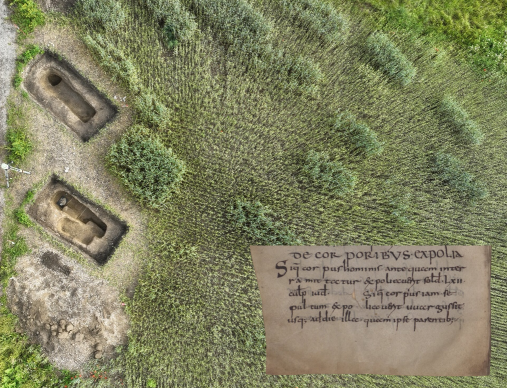The Present Dead: Investigating Interactions with the Dead in Early Medieval Central and Eastern Europe from 5th to 8th Centuries CE
The project aims to investigate the practical, conceptual and emotional dimensions of human interactions with the materials of the dead (graves, human remains and artefacts) in early medieval central and eastern Europe (5th to 8th centuries CE). Based on archaeological and textual evidence, diverse contexts of contact will be investigated through an innovative approach combining cutting-edge scientific methods, technical solutions and new theoretical approaches. The project’s working hypothesis is that perspectives on interaction with the materials of the dead will vary with the ritual stages of funerals.
Early medieval cemeteries comprise of up to hundreds of graves where corpses were generally inhumed in individual graves, frequently together with lavish objects. Many graves were interfered with soon after burial. While disturbed graves have elsewhere been seen as an inferior source of evidence, this project argues that these interventions are important sources for early medieval practices relating to the dead. Investigating cemeteries and out-of-cemetery contexts in four central- and eastern European regions it pursues the following objectives:
1. Investigating the range of practices and contexts in the archaeological records.
2. Analysing textual perspectives in diverse genres.
3. Synthesising material and textual perspectives via an innovative technical solution for semantic integration of data.
The methodological objectives for achieving the archaeological goals are:
1. Consolidation of methods and development of research protocols.
2. Development of strategies to mitigate deficiencies of archaeological data. The development of digital tools, moving from high- to low resolution evidence, will be novel and key to the approach.
The project will significantly contribute to our understanding of the relationship between the living and the dead in early medieval Europe.

| Duration | 01.10.2024 - 31.08.2028 |
| Funding Funding program | European Commission ERC Consolidator Grant |
| Grant amount | € 1.965 598,00 |
| Unit | Department of Classics |
| Profile area Uni Graz | Dimensions of Europe |
| Core research area of the Faculty | Trans-Mediterranean Entanglements |
| Principal investigator | Ass.-Prof. PhD Edeltraud Aspöck |
| Project staff | Laura Elmer, BA. BSc M.A. Thom Gobbitt, PhD Alexander Loidl, BA Michelle Sima, BA. BA. |
| Project homepage | https://cordis.europa.eu/project/id/101089324/en |